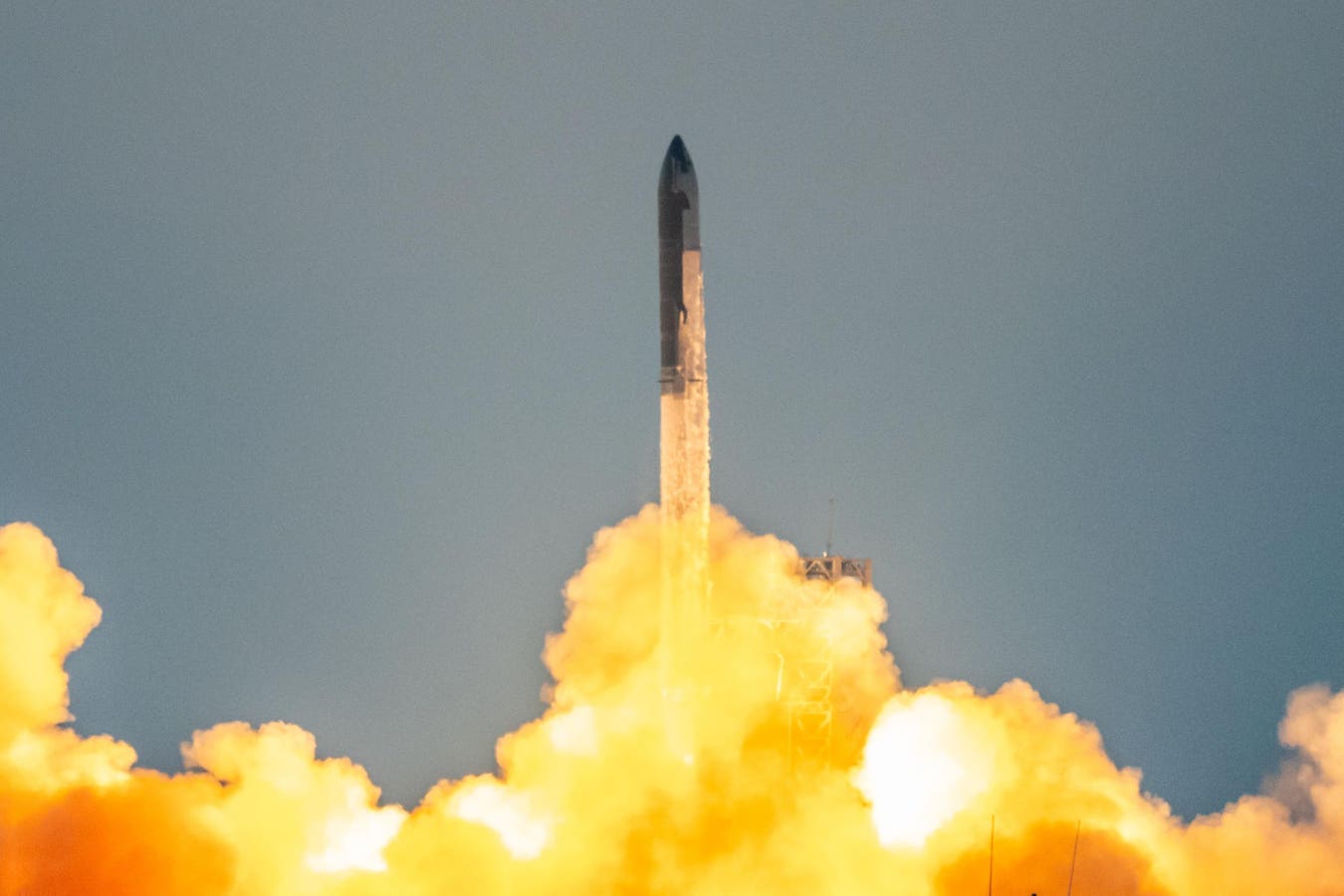In this week’s edition of The Prototype, we look at SpaceX’s plans for Starship, a startup laying a lifeline for leukemia patients, a potential replacement for silicon in processors, and more. You can sign up to receive Prototype in your inbox here.
AFP via Getty Images
Elon Musk may be preoccupied exerting his influence on the incoming Trump administration, but his rocket company is moving forward. This week, SpaceX announced plans to conduct a sixth test flight of the largest rocket ever built since Nov. 18, using the same booster that was successfully recovered from its fifth flight test last month. The next test will have expanded targets from the fifth, the release said, “iterating towards a fully and rapidly reusable launch system.”
The quick turnaround time between the two tests highlights the aggressive testing schedule SpaceX has set for its new rocket system. last week, TechCrunch reported that the company intends to conduct an orbital fuel test of the spacecraft early next year.
Stay tuned.
This startup aims to expand the availability of bone marrow
Osium
Emany years in the United Statesnearly 20,000 people are diagnosed with a life-threatening disease that requires a bone marrow transplant. These transplants allow the body to produce healthy blood cells in patients, especially leukemia. Approximately 70% of people do not have a bone marrow match in their family, so they must rely on donors. But finding a match isn’t always easy – which is why thousands die every year waiting for one. This is in part because it must come from a living donor, and less than 5% of the US population is on the current bone marrow registry.
Kevin Caldwell has a solution to this problem. His startup, Ossium, has developed a technique to cryopreserve bone marrow from the recently deceased, expanding the available bone marrow to include organ donors at the time of death. “This accomplishes two things,” the CEO said Forbes. “One, it creates a source of bone marrow that can be ready within days instead of the months patients have to wait until they need a living donor. Second, we are able to get more bone marrow from an organ donor.”
In September, the company announced positive results for its first transplant patient, whose procedure took place in July. Caldwell said Forbes that the transplant process took less time than a living donor marrow and the patient had no side effects. Since then, three more patients have been treated and all have shown positive results so far, the company said.
DISCOVERY OF THE WEEK: A NEW TYPE OF TRANSISTOR
Researchers at MIT created a new type of transistor using semiconductor nanowires composed of gallium antimonide AND iridium arsenide instead of silicon. Transistors are designed to take advantage of a property called quantum tunneling to move electricity through transistors. The end result? “You can use it with all the functions that silicon currently has, but with much better power efficiency,” researcher Yanjie Shao said in a press release. This could potentially pave the way for processors to use much less electricity than conventional ones. The research findings were published this week in Nature Electronics.
THE FINAL FRONTIER: APPLE HAS INTRODUCED THE SATELLITE PROVIDER
Apple is taking a 20% stake in the satellite communications company GlobalStar as part of a $1.5 billion transaction that includes both equity transfer and expansion iPhone services. GlobalStar’s network enables emergency iPhone messaging in areas without cell phone or internet. The funds will support Globalstar’s plans for it launch more satellites to add to its current constellation of 31 and build its ground infrastructure.
WHAT ELSE DO I WRITE THIS WEEK
I wrote about the beginning of dental artificial intelligence Overjetwhich has launched a software package that can identify dental health problems by an X-ray and then enhance the view with Equipped with AI markings and colors to make concerns like cavities clearer to both dentists and patients.
In my next newsletter, InnovationRxI provided some initial thoughts on what the Trump administration will mean for health care, particularly some second-order effects that may flow from its economic policies.
SCIENTIFIC AND TECHNICAL TIDBITS
The first wooden satellitea collaboration between Kyoto University and Sumitomo Forestry, was launched into space earlier this week to determine how well the material works for the spacecraft.
Quantum computing company D-Wave announced benchmarking of its new 4,400-qubit processor, which it says can solve certain problems up to 25,000 times faster than its current technology.
or discover cloned with black legs gave birth to two healthy kits earlier this week, marking the first time a cloned member of an endangered American species has reproduced.
SCIENTIST’S PRO TIP: WAIT FOR FIVE MINUTES A DAY TO LOWER BLOOD LIQUID
If your doctor has warned you about high blood pressureput the phone down and get some exercise. This is the conclusion of researchers at the University of Sydney, who found this five minutes a day exercise such as walking uphill or climbing stairs has the potential to lower blood pressure and prolong it by 20 or more minutes per day is clinically relevant. The findings were published in the journal turnover.
WHAT’S ENTERTAINING ME THIS WEEK
penguin The TV series shows the rise of Gotham City’s crime lord in this spinoff from 2022 Batman. Colin Farrell completely owns the title role, disappearing into his makeup as he pits himself against his working-class villain and Cristin Miloti The aristocratic mafia wants in a bloody chess match who will rule the city. It’s better than it has any right to be. Episodes are currently streaming on Max.
MORE FROM FORBES
